Intensive Cheesemaking Course 1
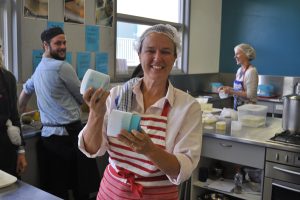 The Intensive Cheesemaking Courses allow you to gain a breadth of cheesemaking expertise and take home your own hand-made cheeses in just one day. The courses are all about making great quality cheeses using proven recipes and straightforward processes. This is done by providing you with good quality milk, the equipment that you will require to make each cheese, detailed notes on making each cheese and hands-on instructions for every step along the way. At the end of the day, you will have made 7 kinds of cheese and you will take all of those cheeses home with you. Some of those cheeses will be ready to consume when you get home, and some will need to be matured by you at home.
The Intensive Cheesemaking Courses allow you to gain a breadth of cheesemaking expertise and take home your own hand-made cheeses in just one day. The courses are all about making great quality cheeses using proven recipes and straightforward processes. This is done by providing you with good quality milk, the equipment that you will require to make each cheese, detailed notes on making each cheese and hands-on instructions for every step along the way. At the end of the day, you will have made 7 kinds of cheese and you will take all of those cheeses home with you. Some of those cheeses will be ready to consume when you get home, and some will need to be matured by you at home.
Each course is run by experienced cheesemaker and instructor, Graham, the owner of Cheesemaking. Graham has been training home and professional cheesemakers for many years and has converted the technical ‘cheesemaking’ speak into easy-to-understand, everyday language. This means that the recipes and instruction sheets you take home with you allow you to make great cheese in your own home kitchen.
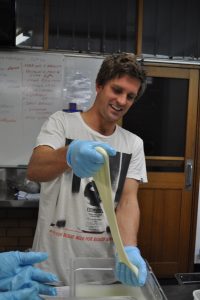 At the course, you will start making one cheese, and when that cheese is almost completed, you will start making another cheese, and so on throughout the day. During the course, there will be the continual provision of theory and technical information while you are making each cheese, so you can understand not only what you are doing but the reasons behind what you are doing. That will be a lot of information to take in, but your course experience will be supported by a take-home 60 page detailed course booklet that contains recipes, notes and handy hints plus an additional 80 page technical information booklet.
At the course, you will start making one cheese, and when that cheese is almost completed, you will start making another cheese, and so on throughout the day. During the course, there will be the continual provision of theory and technical information while you are making each cheese, so you can understand not only what you are doing but the reasons behind what you are doing. That will be a lot of information to take in, but your course experience will be supported by a take-home 60 page detailed course booklet that contains recipes, notes and handy hints plus an additional 80 page technical information booklet.
The selection of cheeses that you will make has been specifically selected to provide a wide range of cheesemaking techniques. Simply put you are using the same milk to make all of these cheeses, but each cheese is different. The application of subtle but different techniques means that one cheese turns out as a Cheddar and another cheese turns out as a Brie, another a Marinated Persian Feta and so on. These techniques are the same as those used by artisan cheesemakers the world over to make these styles of cheese.
Enrol in an Intensive Cheesemaking Course
 Intensive Cheesemaking Course 2
Intensive Cheesemaking Course 2
Details for the Intensive Cheesemaking 2, an advanced cheesemaking course will be released later in 2023. In this course, you will make several kinds of cheese including a soft-washed rind, blue vein, Comte, cultured butter and whey ricotta. There are no prerequisites for this course but attendance at Intensive Cheesemaking 1 or previous cheesemaking experience is required.
Where are the cheesemaking courses held?
The courses are held in Brisbane, Sydney, Melbourne, Canberra and Perth. Places at each course are limited to 14 persons per course to maximise personal instruction. Graham is assisted by experienced home cheesemakers in each course to help with instruction, to talk about how they go about making cheese at home, and for you to see the impressive range of cheeses these home cheesemakers are making based on the same techniques you will learn in your course.
Find when the next course will be held and enrol
 Who teaches the courses?
Who teaches the courses?
The courses are presented by Graham. Graham knows a lot about how to make great cheese and enjoys sharing his experience and knowledge with others, and has many years of experience in the dairy industry from the dairy farm to the cheese factory. He has formal qualifications in Cheesemaking, Food Technology and Business, and still works with artisan cheesemakers in Australia, Italy, France and the UK. Graham developed Australia’s first Farmhouse Cheesemaking courses in 1997, which was the predecessor of the current Intensive Cheesemaking courses.
Make cheese before you get to the course!
Having cheesemaking experience prior to attending the course will be highly beneficial due to the intensive level of information and technology that are provided. Prior cheesemaking experience will enable you to quickly recognise the more basic cheesemaking information and skills that are provided at the course, allowing you to take in more of the detailed information and techniques provided.
Once you have enrolled in a course, you will be offered the opportunity to purchase one of the several cheesemaking kit options. Prices start from $60 and the kit options are listed here. An additional 10% discount is also offered for any of the kits listed.
 Eight hours plus of making cheese
Eight hours plus of making cheese
The first part of the course will cover some key cheesemaking information, then it is time to start making cheese. For the remainder of the day, it is almost nonstop cheesemaking, allowing you to be thoroughly immersed in the cheesemaking processes.
You will be taken through the making of each cheese step-by-step, so you not only know what you are doing but importantly why you are doing it. The ‘what’ and the ‘why’ are vitally important if you want to make good quality cheese consistently at home. Demonstrating and discussing these techniques is what Graham does well. You will be given simple instructions with simple explanations along each step of the cheesemaking process.
The courses will start at 8am and conclude at 4.30pm.
Making cheese at home
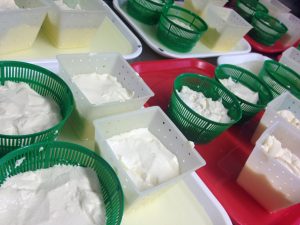 At the end of the course, you will have already received an enormous amount of cheesemaking information. There will also be a small discussion about how you transfer the equipment, information and techniques from the course so that you can get started in your own home. As part of the course, you will take home with you 6 cheesemaking hoops and/or baskets valued at $32. You will have the opportunity to purchase some rennet and cultures at the course so that when you leave the course, you will have most of the items needed to start making these same cheese as soon as possible after the course.
At the end of the course, you will have already received an enormous amount of cheesemaking information. There will also be a small discussion about how you transfer the equipment, information and techniques from the course so that you can get started in your own home. As part of the course, you will take home with you 6 cheesemaking hoops and/or baskets valued at $32. You will have the opportunity to purchase some rennet and cultures at the course so that when you leave the course, you will have most of the items needed to start making these same cheese as soon as possible after the course.
Taking your cheese home
 Some of the cheeses that you make will be fresh and ready to be eaten when you get home. However, the Greek Feta, Brie, Marinated Persian Feta and Cheddar will require some at-home maturating. The details for how to go about this will be in your course booklet but will also be discussed towards the end of the course.
Some of the cheeses that you make will be fresh and ready to be eaten when you get home. However, the Greek Feta, Brie, Marinated Persian Feta and Cheddar will require some at-home maturating. The details for how to go about this will be in your course booklet but will also be discussed towards the end of the course.
What do others think about the cheesemaking course?
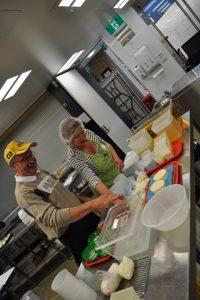 You can read reviews about the course at these locations:
You can read reviews about the course at these locations:
The cheeses that you will make
The cheeses that you will make and take home with you are:
- Farmhouse Cheddar: This cheese demonstrates the techniques for making pressed, and hard cheeses. These same or similar techniques are used for making many other aged and harder and pressed styles of cheese, examples such as Edam, Gouda, Tomme, Cheshire, Caerphilly, Emmenthal, Gruyere and Cantal. Your cheddar will need to be aged for 3 – 9 months after the course.
- Creamy Brie: Brie has a lovely velvet coat of white mould. The techniques used to make Brie allows you to make any of the cheeses from the white moulded family such as Camembert, Triple Cream, Coulommiers, Neufchatel, Chaource, Truffle Brie and Ashed Brie. These styles are discussed at the course or are in your course notes booklet.
- Quark: This is a very similar cheese to cream cheese but there are also many alternatives that you can easily make at home such as goat curd, Labneh and Chev.
- Marinated Persian Feta: You will take this cheese home with instructions on how to marinate it with your favourite blend of oil and herbs.
- Soft Fresh Cheese: this is a French fresh lactic acid set style of soft cheese. It is traditionally formed into a log, crottin or pyramid. This cheese will be ready to eat when you get home. Just pick up some fresh bread and a nice wine on the way home. At home, you might try the many variations for this cheese, such as adding herbs and making a French-style lactic cheese with that typical ashed or Geotrichum wrinkled rind appearance.
- Cultured Buttermilk Ricotta: This is the simplest cheese that you will make, it uses cultured buttermilk instead of harsh acids, so it is very soft and milky when made correctly. Similar varieties that also use these same techniques include Paneer, Smoked Ricotta, Ricotta Salata and Baked Ricotta. Due to time constraints, this cheese will be a demonstration only.
- Whey Ricotta: This is the gourmet of all ricottas. It is soft, delicate and creamy and a great way to use your whey, a product of cheesemaking that is often discarded. It is also difficult to find this extra soft ricotta in most stores. Due to time constraints, this cheese will be a demonstration only.
- Greek Feta: Feta can be a strong flavoured, dry and sometimes salty crumbly cheese that is a great addition to fresh salads, or you can very simply adjust the recipe to make it a soft creamy cheese that can be eaten a few days after you make it. Due to time constraints, this cheese will be a demonstration only.
All of the above cheese can be made using cow or goat milk however only cow’s milk will be used at the course.
Have any questions?
Send me an email to info@cheesemaking.com.au or call me on 0408 198 952.
I look forward to making cheese with you soon.
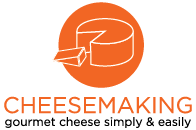
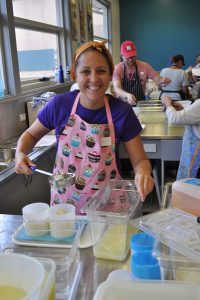 Intensive Cheesemaking Course 2
Intensive Cheesemaking Course 2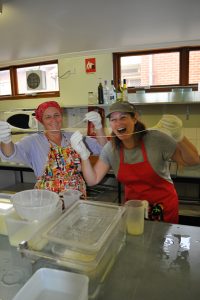 Who teaches the courses?
Who teaches the courses?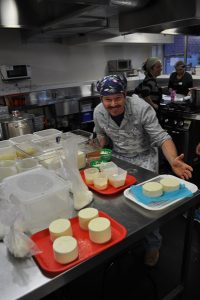 Eight hours plus of making cheese
Eight hours plus of making cheese